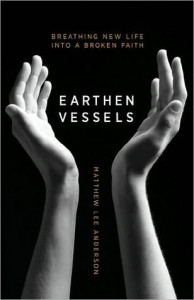 Today, I’m having a conversation with Matthew Lee Anderson, author of the new book, Earthen Vessels: Why Our Bodies Matter to Our Faith
Today, I’m having a conversation with Matthew Lee Anderson, author of the new book, Earthen Vessels: Why Our Bodies Matter to Our Faith. Matt blogs at Mere Orthodoxy and writes often for Christianity Today. I wrote this endorsement of his book:
Tattoos, cremation, abortion, gay sex, yoga, online church: No subject is off limits in Matthew Anderson’s provocative book on the body. Anderson challenges us to deepen our understanding of what it means to be embodied. When it comes to body matters, the body matters. Though few will agree with all of Anderson’s diagnosis and prescription, all who read this book will be challenged to consider how our views of the body line up with (or depart from) Scripture and Christian theology. This is a highly ambitious project that deserves careful consideration.
Trevin Wax: Matt, one of the points you make in your book is that evangelicals have not given enough attention to the body. Are you talking about book-length treatment of the body, or are you speaking more generally of our view of heaven, resurrection, spiritual discipline, etc.”? How does this lack of attention work itself out in practice?
Matthew Anderson: I should probably narrow my claim there to, “Evangelicals have not given enough attention to the body from a uniquely theological standpoint.” That is, we haven’t made it a point of conscious reflection in our theological efforts. I think there are lots of strands of evangelicalism that contain aspects of an account of the body that is evangelical, which is why I think the complaint that evangelicals are gnostic is somewhat overstated. But have we been as consciously attentive to the body from a theological perspective as we should be? Probably not.
Trevin Wax: So, we’re not gnostic per se, but we have not been consciously thinking about our bodies theologically? What does “a uniquely theological standpoint” look like? How does it play out practically, let’s say, in how we consider tattoos and piercings?
Matthew Anderson: Yes, I think that’s the right way of putting it. I think in order to be “gnostic,” you should consciously be trying to escape the body. Not everyone is going to agree with that, of course, but inattention is not the same as repudiation or rejection. And honestly, there hasn’t been nearly as much of the latter (that I can find) as people tend to say. I qualify this, though, and note I’m not a historian and could be wrong.
As for a “uniquely theological standpoint,” I think it’s one that starts with the revelation of Jesus Christ and reflects on our embodied experience and our matter through that lens. We talk a lot about why Jesus had to die to accomplish our salvation, and rightly so. But why did he have to take on a body? And why did he have to die bodily? And what significance does that have for our bodies? Those are all questions we can ask of the counsel of Scripture without thinking about medicine or science or dieting.
How that plays out practically in, say, tattoos….someone should write a book on that. 😉
Trevin Wax: You talk about viewing our bodies through the lens of Jesus’ incarnation and bodily death. Curious, you didn’t mention the resurrection (which you do in the book, so you’re off the hook, I guess!). How has the truth of the resurrection influenced (historically) Christian thought on the body? And how should it influence the choices we make today?
 Matthew Anderson: Well, leaving the resurrection aside was definitely a mistake. It’s hard to say how pervasive the influence of the doctrine has been on Christians throughout the centuries. But I think one of the central things the resurrection grounds is hope, which seems to be a uniquely Christian virtue. The possibility of restoration and an embodied life after death allows for a sort of flagrant disregard for death. In light of the resurrection, death’s power turns out to be no power at all. And that enabled the martyrs to enter cheerfully into their sufferings (even while it sometimes might have made them a little too eager to die) and others to kiss those who were dying of deadly diseases as a way of bringing comfort.
Matthew Anderson: Well, leaving the resurrection aside was definitely a mistake. It’s hard to say how pervasive the influence of the doctrine has been on Christians throughout the centuries. But I think one of the central things the resurrection grounds is hope, which seems to be a uniquely Christian virtue. The possibility of restoration and an embodied life after death allows for a sort of flagrant disregard for death. In light of the resurrection, death’s power turns out to be no power at all. And that enabled the martyrs to enter cheerfully into their sufferings (even while it sometimes might have made them a little too eager to die) and others to kiss those who were dying of deadly diseases as a way of bringing comfort.
Which is, I think, precisely how the doctrine should affect us now. With all our emphasis on the intrinsic goodness of the body and of sexuality, we have to remember the corruptibility and decay of the body and look elsewhere for permanence and stability. When it comes to choices that we make, I think we need to be careful to see the counterfeit resurrections that are being held out to us, if I can use a phrase that echoes your own “counterfeit gospels,” and ensure that our hope is found in nothing less than Jesus’ blood, righteousness, and risen body.
Trevin Wax: You mentioned our need to look elsewhere (and not the body) for permanence and stability. What about identity? Our society is becoming increasingly muddled on issues of gender and sexuality, with men claiming to be women trapped in male bodies, etc. Likewise, one of the reasons it is so difficult to have a conversation about the nature and morality of homosexuality is because those who engage in homosexual behavior often conflate their behavior/attractions with their identity. Sexuality becomes the primary identity, the defining aspect of who they are. How does a Christian view of the body affect our identity when it comes to gender (male or female) and sexuality (attractions and actions)?
Matthew Anderson: Do we get to the hard questions after this one? Oh, wait….
This is a really delicate issue, and one that I probably can’t do justice to here (though I give it a fighting effort in the book). On the one hand, Christians want to relegate the status of sexual identity to the edges, rather than the center. Our identity is to be firmly in Christ and we are to take the narrative for our own lives not from our sexual desires or dispositions (whether toward people of the same sex or not), but from the narrative of the Gospel.
However, that narrative leaves no part of us untouched, including our sexuality, as it establishes genuine norms for the expression of our sexuality. Part of the problem of our contemporary sexual confusion is a subtle rejection of the body’s role in shaping our identity and self-understanding. Culturally, “gender” sometimes gets treated as though it can be totally separated from the structure of our physical bodies, which turns our bodies into objects that are infinitely malleable either by our own wills or by the social forces and influences around us. A Christian view of the body, though, sees it as a gift that has been given to us by God, and that it’s structure sets the conditions for our freedom and joy. Whatever gender is, I think it is supposed to emerge out of the body and our sexual differences, not overwhelm them and treat them as irrelevant or reconstructible in light of our felt experience of the world.
Trevin Wax: What’s the takeaway from your book in regards to the day-to-day choices we make as Christians? How does a thoughtful, theological perspective on the body affect our choices daily?
Matthew Anderson: A couple ways. First, I think that it changes the way that we pray, such that presenting the members of our body becomes something that we intentionally practice, in the way that we might tithe intentionally or worship on Sunday mornings. That means becoming more attentive to how our feet, ears, eyes, etc. have been trained as “instruments for unrightousness” and deliberatively asking God to retrain them as “instruments for righteousness.”
Related to that, I hope that it makes us engage our whole person in the spiritual disciplines, such that if we are claiming that Jesus is Lord, we are actually kneeling before him to acknowledge his Lordship with our knees as much as our lips and hearts.


















